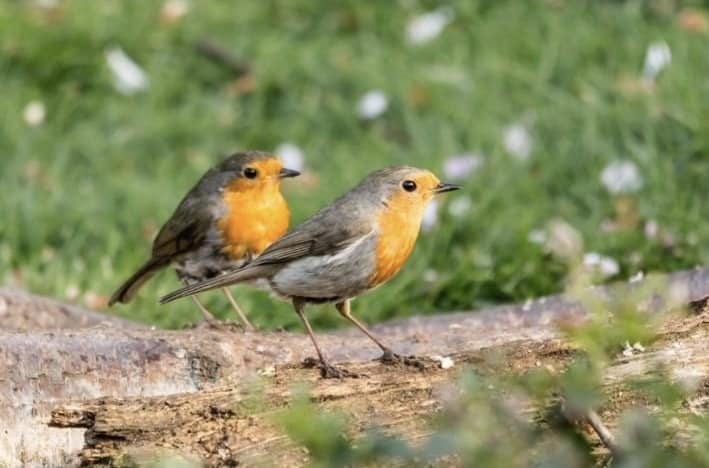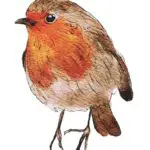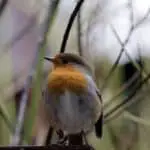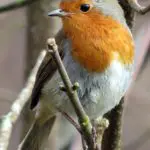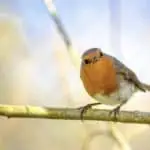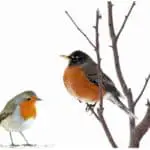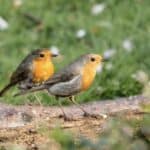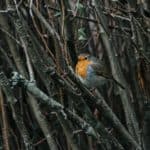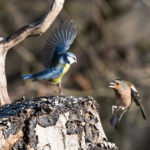Baby robins instinctively know where to fly and are able to find food on their own when they leave the nest. It will not be long before when they become ready to take flight. It may seem like the easiest thing for them – after all, birds are born with wings and feathers.
Baby robins of approximately eight weeks old have a natural instinct to fly. The parents will continue to feed them and protect them for a few more weeks. Eventually, the young robins will be on their own.
When do Baby Robins become Ready To Leave The Nest?
There is a lot of speculation about where and when they leave the nest. Most baby birds will leave the nest within two or three days of fledging. They will usually start by hopping along the ground before they can fly short distances.
Baby robins will continue to explore, practicing their flying skills until they are around 12 weeks old. At this point, they will be able to fly long distances independently enough to leave the nest for good. Their diet will also begin to change as they start eating more insects.
What is Fledgling?
Fledgling is the process of a young bird leaving the nest and taking its first flight. It usually happens when the bird is around two or three weeks old. However, it can happen sooner if the bird is injured or their nest has been destroyed.
Fledgling is a critical time for baby birds as they are still learning how to fly and they are vulnerable to predators. Hence, parents need to continue to protect them during this time.
Where do Baby Robins Go?
- Go exploring! Once baby robins have left their nest, they will travel around 1 mile away from their birthplace. They will explore their surroundings and look for their own food and a place to stay.
- Join a flock. If baby robins can’t find a place to stay, they may join a flock of other birds. They could be another type of bird or another flock of robins.
- Return to the nest. Sometimes, baby robins will return to the nest where they were born. Usually, this is because they are not yet ready to be on their own or they are injured.
- There are a few different theories that baby robins stay in their territory and fly around within a 3-mile radius of their birthplace. Theories also suggest that they make a long journey to a different part of the country or even to a different continent.
What do Baby Robins do?
European robin chicks follow their parents to warmer climates during the winter, or they stay in the colder climates to find food. Either way, they are adapting to the changing environment. Besides, from eating what their mother feeds them, they will eventually learn things such as how to crack open a seed or which type of insects are edible.
They will also be busy building their own nests and mating with other robins. They will start to raise their own family and prepare for the next generation of robins.
One of the most amazing things that baby robins do, when they are old enough, is build their own nests. They will raise their young and lay their eggs in it.
The nest needs to be sturdy enough to withstand bad weather conditions and robins will spend a lot of time working on it. They will use twigs, grass, and leaves, to build the nest and line it with soft materials such as feathers.
Once baby robins have left the nest, they will start mating with other robins. They will create their own family and continue the cycle of life.
Female robins will lay around three to four eggs. They will take care of the eggs until they hatch and take care of their young until they are ready to leave the nest too.
Do Baby European Robins migrate?
No, baby European robins do not migrate. They stay with their parents until they are ready to fly and fend for themselves. Once the young robins are old enough, they will start to establish their own territories and will no longer need to rely on their parents for food and protection. Yes, they will start to wander around in their territory and eventually settle down in a new place.
Potential Predators
As they explore their surroundings, they will also be on the lookout for potential dangers. Baby robins will need to be able to fly quickly and accurately in order to escape if necessary. Some of the things they may encounter include:
- Predators such as hawks, cats, and snakes
- Injury or sickness because of the changes in the environment
- Lack of food due to natural disasters or climate change
- Car accidents and other accidents through man-made objects
- Weather conditions such as storms and extreme weather
What should we do?
Robins will be affected by the same things that are affecting us. They may struggle to find food and suitable places to stay due to the changes in the environment. They will also be susceptible to predators and injury.
As we continue to cause damage to the environment, it is going to have a detrimental effect on natural life. We need to do our part to help preserve the environment so that these birds, as well as other natural wildlife, can thrive. The cycle of life is an important part of the ecosystem, and birds play a vital role in it.
As you can see, baby robins have a lot of responsibilities once they leave the nest. They will learn how to fly and find their own food. They will also mate and build their own families.
Baby robins are very adaptable. They will be continuously exploring their surroundings, and they will need to be mindful of any potential dangers. It’s certainly a very adventurous and exciting time for them!
